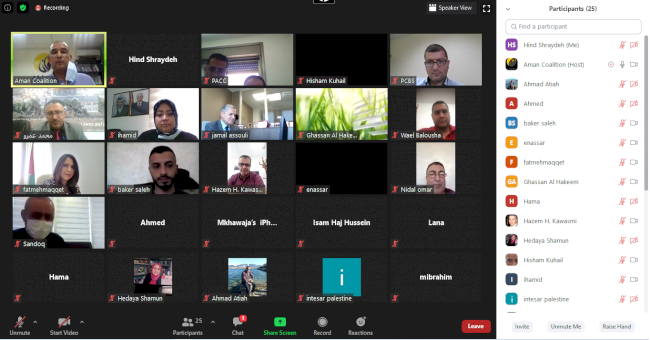
Ramallah – Via Zoom, the Coalition for Accountability and Integrity (AMAN) held a session to discuss a diagnostic study on the current context of non-ministerial government bodies. The event brought together representatives of these public institutions as well as civil society experts. Engaging all relevant parties, the study and discussion aimed at contributing to the efforts made to achieve a slimmer structure of the Executive branch of government, develop and improve the management of public institutions, and come up with relevant practical recommendations. These would be presented to decision-makers with a view to enhancing the Executive structure, role, and priorities at this stage.
Majdi Abu Zeid, Executive Director of AMAN, stated that AMAN compiled the study at the end of 2019 to support the Palestinian government efforts, rationalise public expenditure, and reduce the public budget deficit. To meet national needs, this research input serves to regularise public institutions. It is in consistence with the Council of Ministers’ Decision No. 61, dated 15 June 2020, on the Establishment of a Committee for the Governance of Non-ministerial Government Bodies. Abu Zeid concluded that “AMAN hopes that the study and recommendations contribute to supporting the government pursuit in this area.”
AMAN’s study investigates the current context of non-ministerial government bodies, which have been established in accordance with Article 69(9) of the Basic Law. Covering the period from establishment of the Palestinian National Authority (PNA) towards 2019, the study involves 62 government bodies and institutions.
Rationalisation has acquired greater urgency
Authored by researcher Anan Jab’iti, the study shows that many non-ministerial government bodies can be merged in order to maintain slim Executive bodies. These can carry out their competences in existing ministries, administrations, or other public institutions. Importantly, tasks and powers of these bodies need to be reviewed in line with the PNA operational plans and needs at this stage. Required regularisation and revisions will be in place. In some public institutions, board members need to understand and apply a correct and rational concept of the subject, volume and level of financial and administrative independence.
Structuring non-ministerial government bodies to serve priorities of the national project
The study comes up with key recommendations, which contribute to enhancing the agendas and operations of non-ministerial government bodies and address the problems they face. These tasks are implemented by the committee, which the Council of Ministers established, to restructure non-ministerial government bodies. Of these recommendations, a guidance manual will be developed to identify guiding principles for the restructuring process. The manual will consolidate the concepts and roles of public institutions as well as financial and administrative independence. A legal framework will be endorsed to regulate the new reality of some institutions. Reporting lines will be set in compliance with the provisions of the Basic Law.
Reviewing State institutions is necessary more than 25 years after operation
In his comments, Dr. Azmi Shuaibi, Advisor to AMAN’s Board of Directors for Anti-Corruption Affairs, made clear that public institutions had been created to meet immediate start-up needs at the time. Now, 25 years later, we need to review and assess the current structure of the PNA public administration. The PNA structure and Palestinian political will should be restructured in order to bring about the national project and resist the Zionist enterprise. To ensure successful remedies, Dr. Shuaibi stressed the importance of engaging experts and national figures in the review process.
Commenting on the relevance of state institutional restructure, a representative of the Palestinian Anti-Corruption Commission (PACC) commended the Council of Ministers for compiling a comprehensive national list of non-ministerial government bodies as a first step towards the rationalising process in the interest of citizens – service recipients. The PACC representative also highlighted that the definition of public institutions is legislatively flawed. A procedure manual should be in place before a decision is made on creating a public institution with a view to making sure it fulfil due conditions and standards.
In the ensuing discussion, participants stressed the need for an in-depth analysis of each individual institution. Field visits to, and interviews with, these institutions should be conducted.
After discussants’ notes and recommendations are included, AMAN will submit the study to the Council of Ministers and its committee to follow up on relevant outputs.
